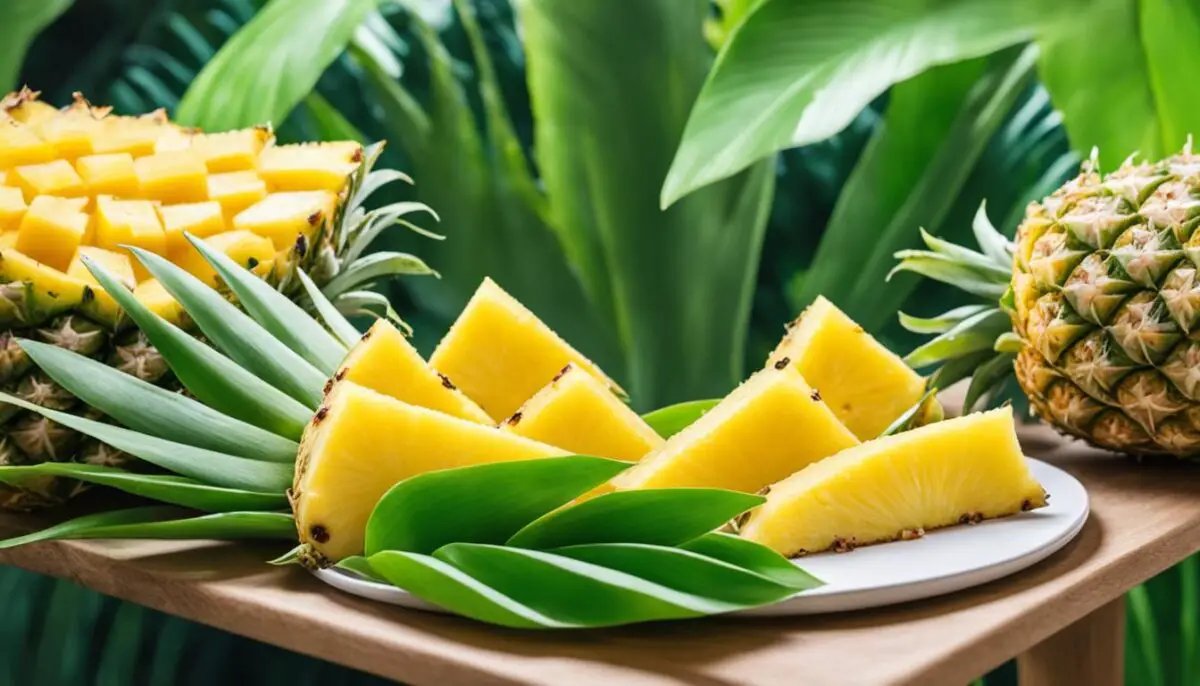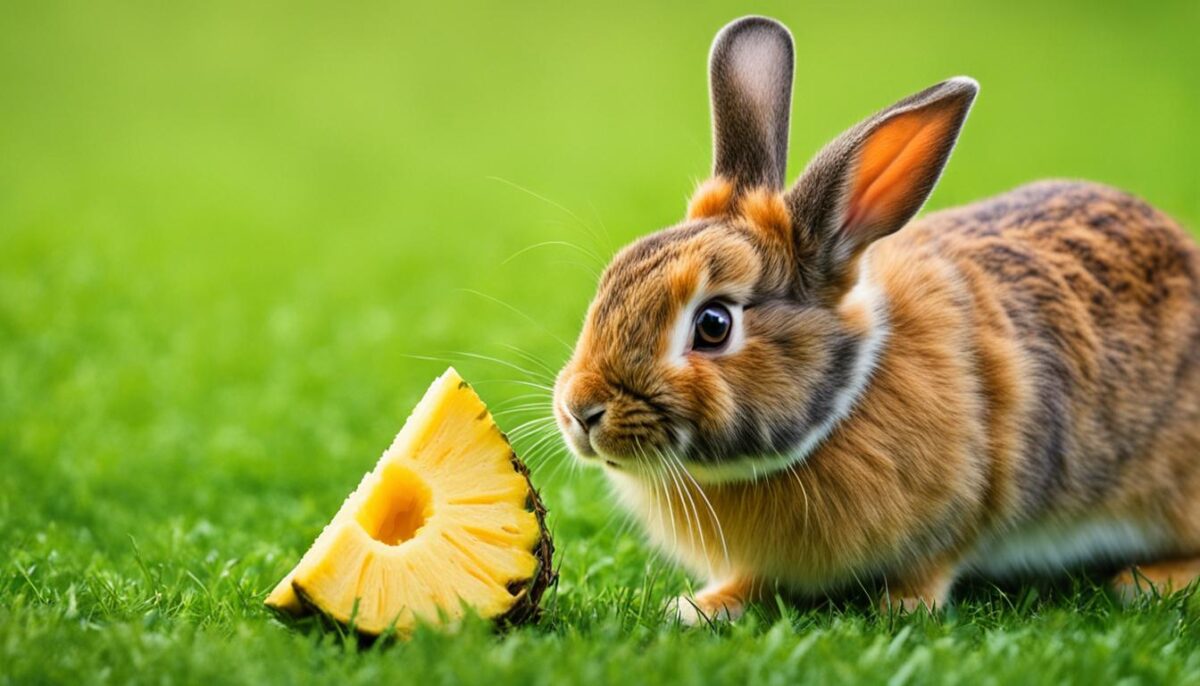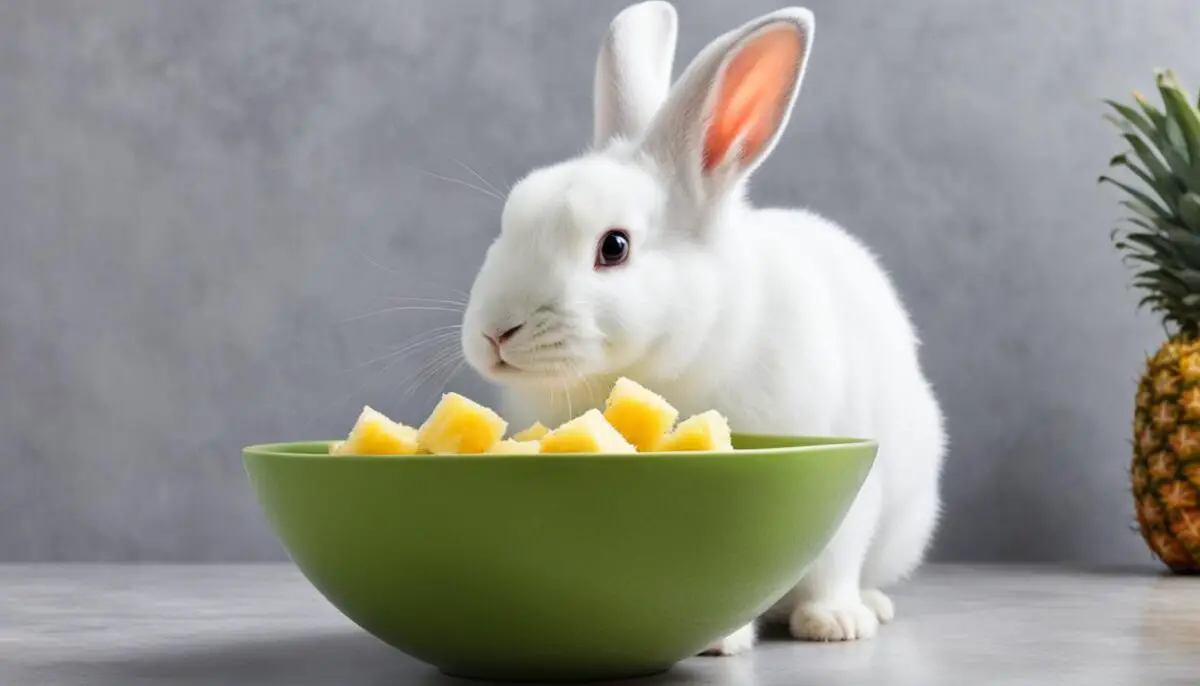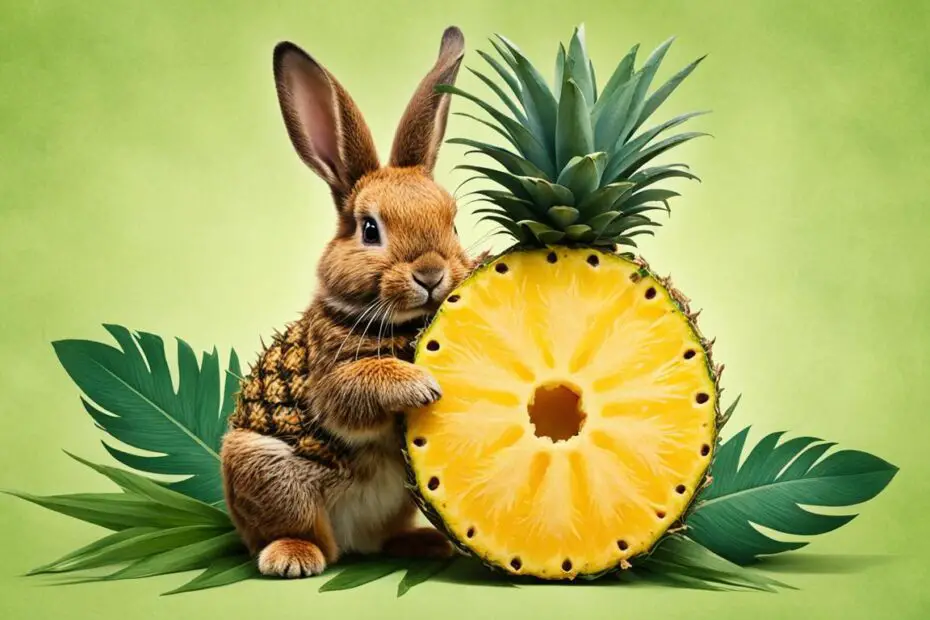Pineapple is a delicious fruit that many people enjoy, but can rabbits enjoy it too? In this article, we will explore whether or not rabbits can have pineapple as a snack, the potential benefits of pineapple for a rabbit’s health and digestion, and any risks or allergies associated with feeding rabbits pineapple.
Key Takeaways:
- Rabbits can eat pineapple in moderation as a treat.
- Pineapple is a good source of essential nutrients for rabbits.
- Excessive consumption of pineapple can negatively affect a rabbit’s digestive system.
- Monitor your rabbit’s response to pineapple and introduce it slowly into their diet.
- Offer alternative fruits and vegetables to maintain a balanced rabbit diet.
Nutritional Value of Pineapple
Pineapple is not only delicious but also packed with essential nutrients that can benefit rabbits. This tropical fruit is a rich source of vitamins, minerals, antioxidants, and enzymes that contribute to overall health. Let’s take a closer look at the nutritional value of pineapple:
Vitamins in Pineapple
Pineapple is particularly high in vitamin C, which is important for the immune system and promotes collagen formation. It also contains thiamin (vitamin B1), riboflavin (vitamin B2), and vitamin B-six, which are necessary for energy metabolism and maintaining a healthy nervous system.
Minerals in Pineapple
Pineapple provides several minerals that are essential for various bodily functions. It is a good source of potassium, which is important for maintaining proper fluid balance and nerve function. Additionally, pineapple contains manganese, a trace mineral that supports bone health and acts as a cofactor for enzymes involved in metabolism.
Bromelain in Pineapple
One of the unique components of pineapple is bromelain, an enzyme with anti-inflammatory properties. Bromelain has been studied for its potential health benefits, including reducing inflammation, promoting digestion, and supporting the immune system. While rabbits produce their own enzymes for digestion, the presence of bromelain in pineapple may aid in the breakdown of proteins and improve gastrointestinal health.
Antioxidants in Pineapple
Pineapple contains various antioxidants that help protect cells from damage caused by free radicals. These antioxidants, such as vitamin C and beta-carotene, may play a role in reducing the risk of chronic diseases and promoting overall well-being.
Overall, the nutritional value of pineapple makes it a healthy addition to a rabbit’s diet. However, it’s essential to offer pineapple in moderation and observe your rabbit’s individual response. Now that we understand the nutritional benefits of pineapple, let’s explore whether rabbits can safely consume this tropical fruit in the next section.

Can Rabbits Eat Pineapple?
Yes, rabbits can eat pineapple, but it should be given to them in moderation. Pineapple is high in sugar, and rabbits have a sensitive digestive system that can be negatively affected by excessive sugar consumption. It’s important to introduce pineapple slowly and monitor your rabbit’s reaction to ensure it doesn’t cause any digestive issues.
Pineapple Benefits and Risks for Rabbits
Pineapple can be a beneficial addition to a rabbit’s diet, providing both health benefits and potential risks. Understanding the effects of pineapple on rabbits is crucial to ensuring their well-being.
Benefits of Pineapple for Rabbits
Pineapple is a good source of fiber, which plays a crucial role in a rabbit’s digestion. The fiber content in pineapple can help promote a healthy digestive system, prevent gastrointestinal issues, and regulate bowel movements.
Additionally, pineapple contains antioxidants that can support overall rabbit health. Antioxidants help combat free radicals in the body, reducing the risk of chronic diseases and promoting a healthy immune system.
Risks of Pineapple for Rabbits
While pineapple can provide some benefits, it is important to note the potential risks associated with feeding rabbits too much pineapple. Rabbits have delicate digestive systems that can be disrupted by excessive sugar consumption. Too much pineapple can lead to stomach upset, diarrhea, or even allergies in some rabbits.
Feeding rabbits large quantities of pineapple or introducing it too quickly into their diet can cause digestive issues. To minimize the risks, it is crucial to offer pineapple as a treat in moderation and carefully observe your rabbit’s response.
Feeding Guidelines
Here are some guidelines to follow when feeding pineapple to your rabbits:
- Introduce pineapple gradually and in small amounts to assess your rabbit’s tolerance and digestive response.
- Start with approximately 1 teaspoon of pineapple and slowly increase the portion size over time, if well-tolerated.
- Monitor your rabbit for any signs of stomach upset, diarrhea, or allergies. If these symptoms occur, discontinue feeding pineapple and consult a veterinarian if necessary.
To give you a visual representation of the benefits and risks of feeding pineapple to rabbits, here is a table summarizing the key points:
| Benefits of Pineapple for Rabbits | Risks of Pineapple for Rabbits |
|---|---|
| Good source of fiber for digestion | Potential for stomach upset |
| Contains antioxidants for overall rabbit health | Risk of diarrhea |
| Possible allergies in some rabbits |

It’s important to remember that while pineapple can be a beneficial treat for rabbits, it should never replace their main diet of fresh hay, water, and a variety of vegetables.
Feeding pineapple in moderation, along with a balanced and varied diet, can contribute positively to a rabbit’s overall health and well-being.
By understanding the benefits and risks of pineapple for rabbits and following the appropriate feeding guidelines, you can provide your furry friend with a healthy and enjoyable treat.
Alternatives to Pineapple in a Rabbit’s Diet
If you’re looking for healthy alternatives to pineapple for your rabbits, there are a variety of safe fruits and vegetables that can be incorporated into their diet. These alternatives offer essential nutrients and can provide a tasty and balanced diet for your furry friends.
Safe Fruits for Rabbits
When it comes to fruits, dried cranberries and dried apples are excellent options for rabbits. These fruits are naturally sweet and provide a delicious treat for your furry companions. Just remember to offer them in small amounts to avoid overconsumption.
Safe Vegetables for Rabbits
Rabbits also enjoy a range of vegetables that are safe for their consumption. Papaya is a great choice, as it is low in sugar and high in fiber, promoting healthy digestion. Carrots and cucumbers are also safe options that can be given to rabbits in moderation.
Note: It’s important to introduce new foods slowly to your rabbits and monitor their reactions. If you observe any signs of digestive upset, it’s best to consult with a veterinarian.
| Safe Fruits | Safe Vegetables |
|---|---|
| Dried cranberries | Papaya |
| Dried apples | Carrots |
| Cucumbers |

In conclusion, pineapple can be a delicious and nutritious addition to your adult rabbit’s diet when given in moderation. Following these feeding guidelines will help ensure your rabbit’s digestive health and overall well-being. Remember to monitor their response and consult a veterinarian if you have any concerns.
Signs of Pineapple Overconsumption in Rabbits
Rabbits love the taste of pineapple, but overfeeding them can have negative effects on their health. It’s important to be aware of the signs of pineapple overconsumption in rabbits to prevent any potential issues.
Here are some common signs to be aware of:
- Dropping food bowls: If you notice that your rabbit is dropping their food bowls more frequently than usual, it could be a sign that they are overeating pineapple.
- Decreased appetite: Rabbits have delicate digestive systems, and excessive pineapple consumption can lead to a loss of appetite. If your rabbit suddenly shows disinterest in their food, it’s worth considering if they have had too much pineapple.
- Digestive problems: Diarrhea is a common digestive issue that can occur if rabbits consume too much pineapple. Keep an eye out for any changes in your rabbit’s litter box habits or the consistency of their droppings.
If you notice any of these signs, it is crucial to take action to ensure your rabbit’s well-being. Here’s what you can do:
- Reduce or eliminate pineapple from your rabbit’s diet: If you suspect that overeating pineapple is causing these symptoms, start by reducing the amount of pineapple you give them or stop feeding it altogether.
- Consult a veterinarian: If your rabbit’s symptoms persist or worsen, it’s essential to seek professional advice. A veterinarian can assess your rabbit’s condition and provide the appropriate treatment.
Keep in mind that every rabbit is unique, and their tolerance to pineapple may vary. It’s crucial to pay attention to your rabbit’s individual reaction and adjust their diet accordingly.
Remember, moderation is key when it comes to feeding your rabbit pineapple. By being observant and responsive to their needs, you can ensure that your furry friend enjoys a healthy and balanced diet.
Conclusion
In conclusion, rabbits can enjoy pineapple as a treat in their diet. Pineapple offers various nutritional benefits and can support a rabbit’s digestion. However, it’s important to feed pineapple in moderation to avoid potential digestive issues. When introducing pineapple to your rabbit, start with small portions and gradually increase if well-tolerated. Always monitor your rabbit’s response and consult a veterinarian if necessary.
While pineapple can be a safe snack for bunnies, it’s essential to offer a variety of other fruits and vegetables as well to ensure a well-balanced diet. Dried cranberries, dried apples, papaya, carrot, and cucumber are all healthy alternatives that can be given to rabbits in small amounts. These options provide essential nutrients and can add variety to your rabbit’s meals.
Remember, your rabbit’s health and well-being should always be the top priority when considering their diet. By following feeding guidelines and offering a balanced mix of foods, including pineapple in moderation, you can provide your furry friend with a tasty and nutritious diet that they will love.
FAQ
Can rabbits have pineapple?
Yes, rabbits can eat pineapple, but it should be given to them in moderation.
What are the nutritional benefits of pineapple?
Pineapple is a good source of vitamin C, thiamin, riboflavin, vitamin B-six, potassium, and manganese. It also contains bromelain, an enzyme with anti-inflammatory properties.
Can rabbits eat pineapple?
Yes, rabbits can eat pineapple, but it should be given in moderation due to its high sugar content and the sensitive digestive system of rabbits.
What are the benefits and risks of pineapple for rabbits?
Pineapple can provide fiber, antioxidants, and support overall rabbit health. However, feeding too much pineapple can lead to stomach upset, diarrhea, or allergies.
What are some alternatives to pineapple in a rabbit’s diet?
Safe alternatives to pineapple include dried cranberries, dried apples, papaya, carrot, and cucumber. These can be given as healthy and tasty treats in small amounts.
How should pineapple be fed to rabbits?
Pineapple should be introduced slowly to adult rabbits, starting with about 1 teaspoon and gradually increasing to a maximum of 1 tablespoon if well-tolerated. Baby rabbits should not be fed pineapple. Monitor your rabbit’s response to prevent digestive issues.
What are the signs of pineapple overconsumption in rabbits?
Signs of overconsumption include dropping food bowls, decreased appetite, or digestive problems like diarrhea. Reduce or eliminate pineapple from your rabbit’s diet if these signs occur.


